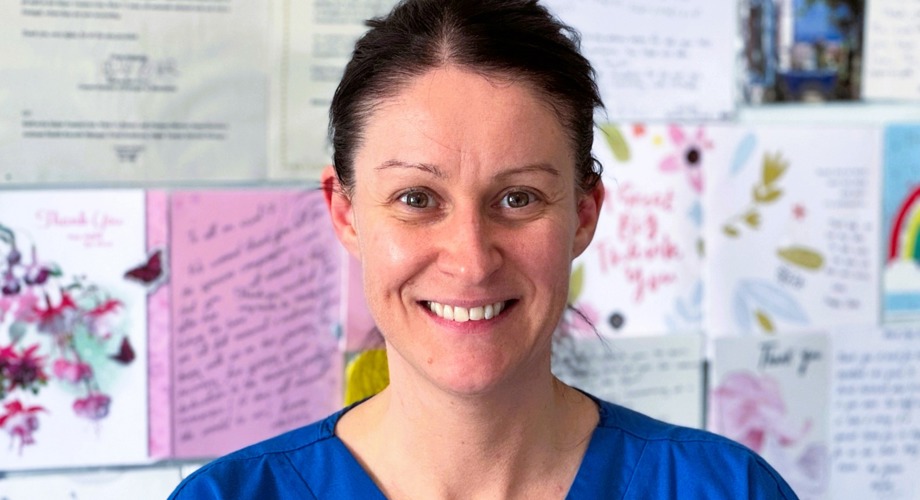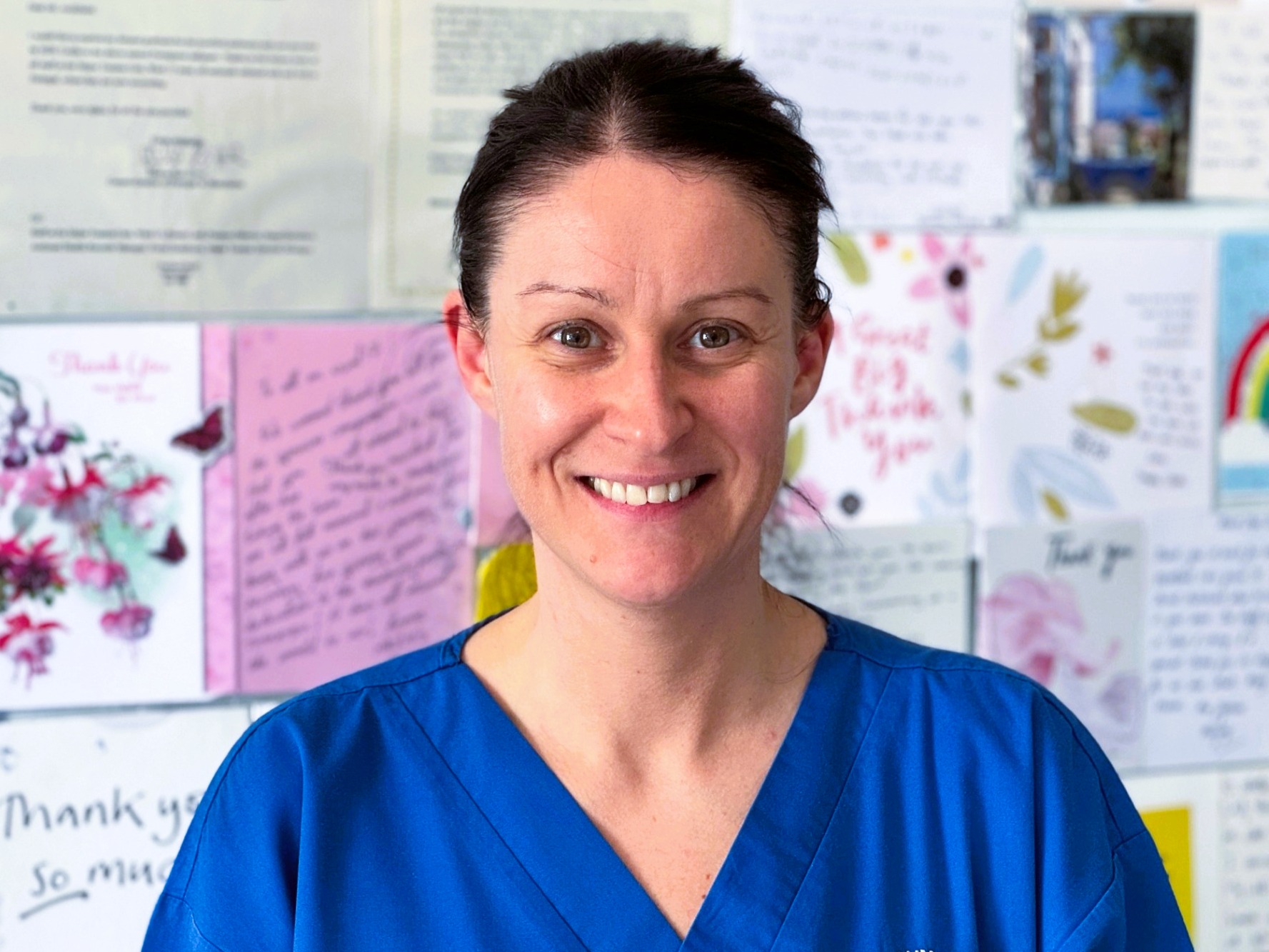
Martin Bryce
12 May 2025
•4 min read

My childhood nursing dream and the marketing detour
From a young age, I was inspired by my hardworking and supportive auntie. I was determined to become a nurse just like her! However, I decided to pursue a marketing degree instead.
For many different reasons, including having a baby, I realised that a career in marketing wasn’t for me. So, I went back to plan ‘A’ and applied to study nursing at university.
The path to advanced nursing practice
I started my NHS career as a staff nurse in orthopaedics. I didn’t have a career plan, but on reflection, I’ve realised I get ‘itchy feet’ every 5 to 6 years and seek out opportunities to progress. Through hard work and a wee bit of luck, I’ve been successful when applying for jobs I really wanted.
After 6 years in orthopaedics, I moved to the infectious diseases team as a charge nurse. After another 5 years, I was looking for my next challenge. I applied for a trainee advanced nurse practitioner role in the acute surgical receiving unit.
I was in the role for 15 months, and to complete my training, I completed a master's degree in advanced practice. It was a significant moment in my nursing career. Although it was a lot of work, it was worth it and gave me a huge sense of achievement.
However, I realised working in the acute surgical receiving unit wasn’t for me. So, I applied for an advanced nurse practitioner role with the East of Scotland Major Trauma Service, and I’ve been here ever since.
The East of Scotland Major Trauma Centre
In 2018, Ninewells Hospital in Dundee became home to the East of Scotland Major Trauma Centre. Other centres in the Scottish Trauma Network are located in:
- Aberdeen, in the North of Scotland
- Edinburgh, in the South East of Scotland
- Glasgow, in the West of Scotland
We all work together to improve and optimise the health and wellbeing of the seriously injured. We help patients, their families, and each other by pioneering clinical excellence, health intelligence, innovation, education, and research.
Find out more about the Scottish Trauma Network.
My role as an advanced nurse practitioner in major trauma
Each role in my nursing career has helped me gain different skills and levels of knowledge to do the job I do now.
My current role is the only one that has given me such a wide range of experiences and professional development. It’s unique and holds my attention because there is always something new to learn. It has also evolved over the last 6 years and is very different from the job I started doing.
I am based in the major trauma ward, but I support the treatment and care of patients throughout the hospital who need my input.
I share this role with other ANPs in the team, and there are 3 main parts to the job:
-
As the clinical advanced nurse practitioner, I work on the ward, monitoring patients, assessing, requesting investigations, reviewing the results, starting interventions, and supervising trainee ANPs.
-
As the trauma coordinator, I have 2 areas of responsibility. The first is ward-based. I coordinate multi-specialty input for patients, serve as the single point of contact to ensure accurate information is available, and arrange local, national, and international repatriation of patients. There are also follow-up clinics, and I refer or signpost patients for onward interventions.
The second is strategic, where I am part of the triumvirate with the clinical lead, network manager, and rehab lead for the Scottish Trauma Network. I’m involved in setting clinical pathways, developing guidelines, training and education, clinical governance, and data and audit collection that inform national policies and guidelines.
-
As the line manager for the major trauma ward, I effectively have the role of senior charge nurse, which I’ve enjoyed since it became part of my role 2 years ago.
I love my job, and what motivates me is seeing the patient's journey.
Holistic patient-centred care
Patients admitted to major trauma may have complex needs and are often seriously injured, frightened, and in pain. I’m in a privileged position to offer holistic patient-centred care starting in the acute phase, making patients as comfortable as possible. Patients then move to the rehab phase, where I give psychological first aid and provide support to them as well as their families.
The best bit is when patients are ready and well enough to be discharged home. This is why we’re here. We can make the worst time in their lives easier and help them get back to independent living. I always think about the care I’d want for myself or my family and deliver that to patients. We aim to provide a gold standard of care to everyone.
Saving lives and giving life back
The Scottish Trauma Network's aspirations are "saving lives and giving life back." In the acute phase of the patient journey, the focus is on saving lives, making the patient comfortable, and managing pain. We rely on the pain team for advice on complex pain management regimes, allowing patients to participate in rehab.
In the rehab phase, the focus is on giving life back and helping the patient regain independence. The rehab team includes occupational therapists, physiotherapists, dietitians, speech and language therapists, and clinical psychologists.
5 things I wish I knew about my role before I started
Denise shares 5 things she wished she knew about her role as an advanced nurse practitioner before she started:
- It can be challenging working in major trauma, as the outcomes aren't always favourable. The team has support from clinical psychology colleagues to help.
- The team in the major trauma service works non-hierarchically. Everyone is respected, valued, and listened to.
- The role has developed significantly in the last 6 years, and this has given Denise lots of experience and opportunities for learning.
- The volume of work while studying for a master's in advanced practice was huge and took up a lot of time.
- Kindness and understanding can make a difference for patients and their families during difficult and challenging times.
Essential skills for an advanced nurse practitioner in major trauma
As an advanced nurse practitioner, I need communication and collaboration skills to succeed in the major trauma ward. I listen to our patients’ needs and make joint decisions on care.
Patients know themselves best and don’t have to follow our advice. They need autonomy over their care, even if that means making decisions I disagree with. All I can do is provide information and advice.
If the patient has the capacity, it is ultimately their decision whether to accept treatment. My role is to listen and provide options.
Learning and development and my 5-year career plan
To help me develop as an advanced nurse practitioner, I need to evidence continuing professional development and reflect on my practice. I must also revalidate with the Nursing and Midwifery Council every 4 years to maintain my professional registration.
Find out more about the Nursing and Midwifery Council.
In my role, I’ve taken on the responsibility of education lead for the East of Scotland Trauma Centre, delivering training to ward staff and trainee ANPs. I’m also a member of a faculty that delivers teaching on HECTOR. It’s a training programme for clinicians and practitioners focused on major trauma and injuries in older people. I’m always learning valuable skills and knowledge by managing the care of medically challenging patients and from other educators.
There are many avenues open to me for career progression. I’m working on my 5-year career plan. Although I’m keeping my options open, I’m considering future management roles and have asked one of the associate nurse directors for career coaching.
The emotional realities of trauma nursing, but why it's all worth it
Nursing is a difficult but rewarding profession. I love my job, but it is not without its challenges. I care for adults and paediatrics, but the outcomes aren’t always favourable.
There are days when I ask myself, “Why do I do this?” My colleagues make me feel happy and energised at work, and I can count on them for emotional support when I need it. Although my role can be emotionally challenging, getting positive patient feedback where they tell me I made a difference at the lowest, most horrendous time in their lives makes it all worth it.

Nursing career progression
Denise's story highlights the incredible career progression possible in nursing. Are you a nurse looking to become an advanced nurse practitioner in major trauma? Explore the advanced practice toolkit to find career development advice and discover the support available from the Advanced Practice Academies.